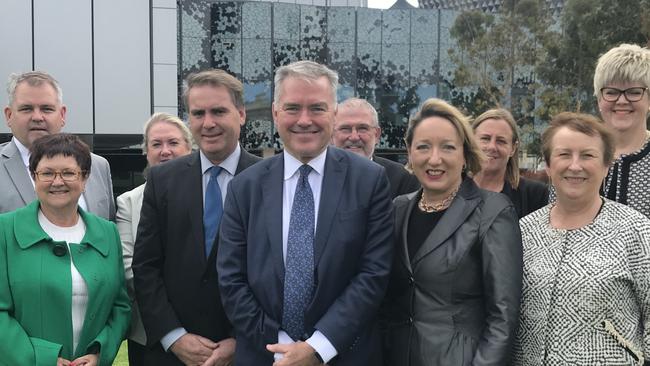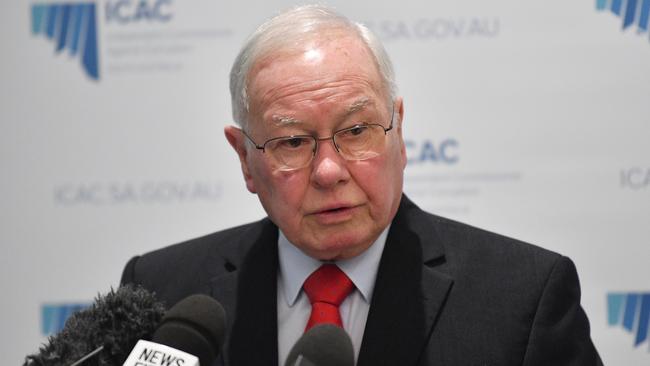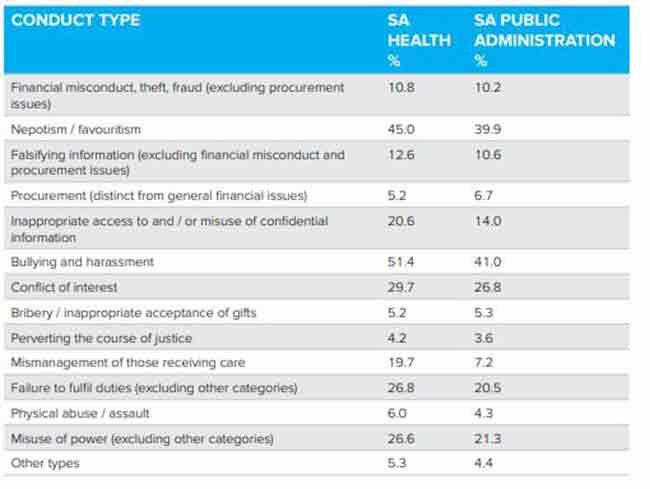Bombshell ICAC report into SA Health tabled in State Parliament
From public funds held in private bank accounts, to a salaried specialist paid full-time despite regularly failing to turn up for work two days a week. These are among the extraordinary case studies which have prompted the ICAC to condemn SA Health as wide open to corruption.
SA News
Don't miss out on the headlines from SA News. Followed categories will be added to My News.
- ICAC wants to investigate ‘corrupt’ SA Health
- SA Health corruption complaints top 100
- How to get the most out of your Advertiser digital subscription
The embattled SA Health department is so badly compromised that patients are being put in danger – and corrupt public servants are escaping prosecution – the state’s anti-corruption watchdog has warned.
In a highly critical report into the state’s $6 billion health system, Independent Commissioner Against Corruption Bruce Lander QC has condemned its “inappropriate integrity culture”.
His bombshell 66-page report into SA Health was tabled in state parliament today and is set to trigger more calls for an independent inquiry including a Royal Commission.
The allegations included highly-paid specialists falsely claiming against taxpayers or signing off their own timesheets, public funds being held in private bank accounts, undeclared conflicts of interests, poor records and blundering of clinical trials.
Despite telling MPs he had only “started reading” the report, Health Minister Stephen Wade rejected calls for an independent public inquiry or a royal commission, as well as any extra funding for Mr Lander to conduct an investigation. Flanked at the Royal Adelaide Hospital by nine of the 10 Local Health Network bosses – but not SA Health chief executive Chris McGowan – Mr Wade announced a public service-led “taskforce”.
While Mr Lander’s report criticised some doctors’ conduct, Mr Wade said reforms would be “fundamentally driven by clinicians, not lawyers”.
The report, handed to ministers last week, found SA Health managed more than a third of the Government’s $5.13 billion tender spending using at least 18,000 suppliers.

Mr Lander’s report, titled ‘Troubling Ambiguity: Governance in SA Health’, was tabled by Attorney-General Vickie Chapman and comes amid a backdrop of growing public concern after ongoing drama and allegations about behaviour within SA Health.
In his scathing report, Mr Lander outlined “several areas of concern that I regard as contributing to the risks of misconduct and maladministration in SA Health”. These are:
TROUBLING ambiguity in its operations;
PUBLIC servants “wanting in integrity” who have been tempted to engage in improper conduct;
MANAGERS facilitating, tolerating and even condoning poor processes;
BULLYING and harassment that has “jeopardised the health, safety and morale of employees”;
INVESTIGATIONS being interfered with;
PERSONAL interests “preferred at the expense of the public interest”;
POOR records management;
FAILURE to adequately monitor highly-paid specialists;
DOCTORS being allowed to build lucrative private practices while still earning taxpayers’ money;
FAILURE to identify, declare and manage conflicts of interest, particularly with some clinicians with “considerable private interests”;
SHODDY clinical trials; and
IRREGULAR and mismanaged tender practices from an agency that accounts for more than a third of the state’s procurement spending.

“These matters should be a concern to all members of the community because SA Health delivers a critical service on which … its most vulnerable depend,” he wrote.
“I have become frustrated with the administration of public health services in South Australia.”
He said it was in the public interest to disclose his wide-ranging concerns “to ensure that SA Health is accountable to the public”.
However, the report details his concerns rather than being a full inquiry, as Mr Lander was refused a request for money to mount a full investigation.
A recent survey of the beauracrats found SA Health respondents “reported more instances of corruption and inappropriate conduct” than those in the wider public service.
Out of 14 conduct types, SA Health recorded higher readings in all but two, including fraud, nepotism, falsifying information, bullying and harassment as well as misuse of patient records and physical abuse or assault.

He said he wrote his report after a corruption investigation was conducted into an unnamed SA Health public servant “had become so compromised by the maladministration within the agency, that there was no longer any possibility of a successful criminal prosecution”.
“This was not the first time this had happened,” Mr Lander wrote.
“I have closed a number of corruption investigations into conduct of SA Health employees because the system is so poorly administered that it hampered my efforts to obtain appropriate evidence.
“SA Health remains at risk because its practices, policies and procedures do not appear to sufficiently guard against corruption and serious or systemic misconduct or maladministration.
“The insights that I have had have identified an inappropriate integrity culture for an organisation entrusted with administering substantial public resources and charged with delivering a critical public service.
“Too many decisions appear to have been made for the sake of convenience, or to suit sectional interests, whilst insufficient regard has been had as to whether those decisions constitute an appropriate use of public funds.”
In one instance he found taxpayers’ money which should have been held in SA Health controlled accounts being held in separate private bank accounts.
Viewing this story on a mobile device? Click here to see the full report
He added: “While SA Health does not have appropriate governance and administrative arrangements, (it) cannot be confident that the full level of clinical care is being delivered.
“The proper governance and administration of health services and excellent levels of clinical care are not either or propositions. The former helps support the achievement of the latter.
“I am concerned that the governance and administrative arrangements in SA Health are ripe for exploitation by corrupt employees. I accept that for every employee who is failing to perform his or her duties there may well be many who are working hours for which they are not remunerated.
“I accept that for every employee with private interests, that compromise their duties to public health, there may be many whose connections and affiliations advance policy and practice, and enhance the provision of public health services.
“But the existence of corrupt and inappropriate practices is not something to be tolerated for those reasons.”
He continued: “If SA Health’s practices, policies and procedures are of a kind that increase the risks of maladministration and thereby allow corruption to occur, they must be addressed.
“How they should be addressed is ultimately a matter for government.”
Growing concerns have ranged from harsh criticism by Central Adelaide Local Health Network’s administrators KordaMentha of previous procurement procedures to evidence of rorting of overtime and industrial blackmail given to a coronial inquiry.
Oakden whistleblower Stewart Johnston also cited the action of “vested interests” within SA Health for his decision to sensationally quit a committee advising on installing CCTV monitoring equipment in nursing homes to help protect residents. He also accused bureaucrats of having “ulterior motives” and said “the cover up is immense.”
As revealed by The Advertiser, the ICAC and its Office for Public Integrity has received more than 1000 complaints about SA Health — the organisation accounts for 20 per cent of such complaints.
The Advertiser also revealed how in August last year Mr Lander asked Health and Wellbeing Minister Stephen Wade for $2 million including eight extra staff to check into SA Health, with the “evaluation” to be completed by the end of this year.
The request was knocked back by Treasurer Rob Lucas who believes ICAC is adequately funded to pursue complaints.
In October, Mr Lander publicly outlined his concerns that SA Health was “riddled with maladministration” and the “very likely” occurrence of corruption.
However, after being denied the extra $2 million for a detailed evaluation of the organisation, Mr Lander instead went ahead with today’s report detailing his concerns without proceeding to the full inquiry
Doctors and nurses groups as well as a victims of the health system including chemotherapy underdosing scandal patient Andrew Knox and Oakden whistleblower Barbara Spriggs have backed calls for an independent inquiry.
Opposition health spokesman Chris Picton said Mr Lander was unable to conduct a full report due to being denied the resources he requested.
“If Steven Marshall is refusing to provide ICAC with the resources it requested to undertake a proper inquiry, South Australians deserve to know why,” he said.
“Steven Marshall simply must ensure ICAC gets the resources it sought to inquire into concerns regarding mal administration and corruption in SA Health.”
